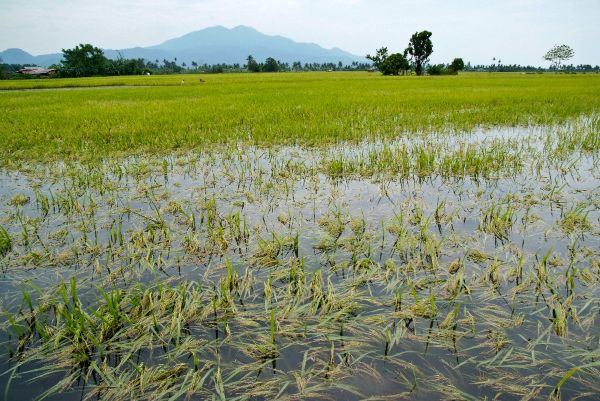Abakaliki Rice Farmers Raise Alarm as Floods Threaten 2025 Harvest, Spark Price Fears

A wave of incessant rainfall and widespread flooding is threatening to derail the 2025 rice production season in Ebonyi State, Nigeria’s rice heartland, with farmers in Abakaliki and surrounding LGAs warning of significant crop losses and looming price surges in local markets.
In separate interviews with the News Agency of Nigeria (NAN), the Abakaliki Rice Farmers lamented that sustained downpours since mid-July have submerged paddy fields, destroyed nursery beds, and caused early yellowing of crops—key indicators of water stress and nutrient deficiency in rice cultivation.
“Almost half of my farm is underwater. What is left is turning yellow. If this continues, we won’t have much to harvest,” said Mr. Emmanuel Nwali, a prominent rice farmer in Izzi LGA.
From Nursery Beds to Flooded Fields: A Season on the Brink
Mr. Chinedu Okenwa, another rice farmer, reported that flooding wiped out his nursery beds, leaving him unable to transplant.
“There’s no backup plan. Without seedlings, we’re stuck. This will affect yields and could trigger a spike in local rice prices next year,” he said.
Mr. Aloysius Njoku, a commercial farmer, echoed similar fears.
“Flooding has devastated large portions of my farmland. Rice will be scarce and expensive if this continues. Everyone, from consumers to traders, will feel it.”
Even subsistence farmers like Mrs. Sylvia Elom, who rely on rice cultivation to supplement household income, are not spared.
“Our people are agrarian. When floods destroy our farms, we are left with nothing—no food, no income,” she lamented.
Expert Insights: Weather Risk Rising in Rice Value Chain
Agricultural extension expert Dr. Paul Onwe explained that rice, especially in lowland or swampy ecosystems, is highly vulnerable to prolonged flooding.
“Once a rice field is submerged beyond tolerable thresholds, plants suffer from oxygen starvation, stunted growth, and fungal diseases,” he said.
He urged farmers to prioritize agro-climatic intelligence, and work with seasonal weather advisories provided by the Nigerian Meteorological Agency (NiMet) at the start of each planting season.
“Climate-smart agriculture is no longer optional. Real-time adaptation is key to survival in this new normal,” Onwe added.
Policy Signals: Government Monitoring, But Response Still Forming
A source at the Ebonyi State Ministry of Agriculture confirmed that the government is tracking flood impacts on rice farms and compiling damage assessments from affected areas. However, no formal relief package or intervention plan has been announced yet.
NiMet’s 2025 Seasonal Climate Prediction had already flagged Ebonyi as one of the high-risk states for flooding, but the severity of current impacts appears to have outpaced preparedness.
BRANDECONOMY INSIGHT: Climate Risk Now a Core Agribusiness Variable
The unfolding crisis in Ebonyi underscores the urgent need to mainstream climate resilience into Nigeria’s rice value chain—particularly in top-producing states like Ebonyi, Kebbi, and Benue, which collectively account for over 60% of domestic rice output.
To mitigate future risks, stakeholders must:
- Scale up climate-resilient seed varieties (submergence-tolerant strains)
- Expand drainage infrastructure in flood-prone regions
- Provide early-season financing and insurance to reduce farmer exposure
- Invest in localized weather data systems and farmer education
For agripreneurs and rice processors, this flood event is not just an agricultural disaster—it’s a supply chain disruption that could cascade into price instability, food security risks, and inflationary pressures in urban markets.
Already, traders in major Abakaliki rice markets are predicting price hikes, as harvest projections plummet and millers prepare for raw material scarcity.
Conclusion: Rice at Risk, Resilience Needed Now
With the 2025 harvest season hanging in the balance, the time for reactive aid is over. Proactive, climate-informed planning and value chain investments are essential if Nigeria is to meet its food security goals and reduce dependence on rice imports.












